|
|
|
Sort Order |
|
|
|
Items / Page
|
|
|
|
|
|
|
| Srl | Item |
| 1 |
ID:
115492
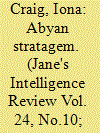

|
|
|
| 2 |
ID:
154988
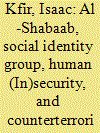

|
|
|
|
|
| Summary/Abstract |
This article examines the link between human security, social identity, and al-Shabaab. The first section explores how social identity group theory can help explain al-Shabaab's recruitment. The second part focuses on the counterterrorism campaign against al-Shabaab, which involves decapitation, aggressive peacekeeping through a proxy in the shape of the African Union Mission in Somalia, and the role of a domestic de-radicalization program. The article concludes that al-Shabaab's allure is in decline and the group is facing internal turmoil, which makes its overtures toward the Islamic State of Iraq and the Levant very dangerous, as al-Shabaab could act as an effective conduit between the Arabian Peninsula and Africa.
|
|
|
|
|
|
|
|
|
|
|
|
|
|
|
|
| 3 |
ID:
118194
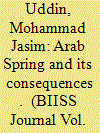

|
|
|
| 4 |
ID:
141545
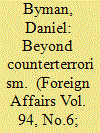

|
|
|
|
|
| Summary/Abstract |
When the Obama administration looks at the Middle East [2], it does so through the lens of counterterrorism. A systematic emphasis on the subject has underscored not just the administration’s relentless pursuit of al Qaeda and its new focus on the self-proclaimed Islamic State [3] (or ISIS) but also a wider swath of its foreign policy, from its drone campaign in northwestern Pakistan to its maintenance of the detention facility in Guantánamo Bay.
|
|
|
|
|
|
|
|
|
|
|
|
|
|
|
|
| 5 |
ID:
175803
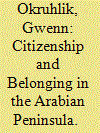

|
|
|
|
|
| Summary/Abstract |
This roundtable is an effort to challenge prevailing assumptions that have long dominated the general discourse about citizenship and belonging. We use the Arabian Peninsula as the site for our discussion. Our scope and purpose involve both theoretical innovation and empirical diversity. Participants are multidisciplinary and put forth ideas that move conversation on the politics of citizenship and belonging beyond the usual suspects: oil and arms, the rentier framework, social contracts that exchange welfare for loyalty, a simple state-centric lens, the primacy of tribal identities, the binary of local or foreign worker, and the binary of the Gulf Cooperation Council (GCC) or Yemen.
|
|
|
|
|
|
|
|
|
|
|
|
|
|
|
|
| 6 |
ID:
128225
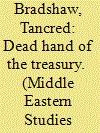

|
|
|
|
|
| Publication |
2014.
|
| Summary/Abstract |
This paper addresses an aspect of British policy in the Trucial States that has received scant scholarly attention. It examines British attempts to promote economic and social development in the Trucial States, and places this policy within the context of British attitudes towards the economic development of the colonial empire. During the 1950s Britain's interest in the Arabian Peninsula expanded, in notable contrast with the rest of the Middle East. One aspect of this expanded role was British efforts to improve the economic and social conditions prior to the discovery of oil in Abu Dhabi in 1958. British officials on the ground were concerned to improve the lot of the population of these impoverished shaikhdoms for a combination of political and strategic and ethical reasons. This article shows that attempts to introduce a modicum of economic and social development in the Trucial States were hindered by the Treasury's refusal to provide adequate funds, and because of inherent problems in finding suitable development projects. Nonetheless, the plans put in place during the 1950s did provide the foundations for subsequent development programmes, which, in turn, drastically expanded as a result of oil wealth.
|
|
|
|
|
|
|
|
|
|
|
|
|
|
|
|
| 7 |
ID:
131462
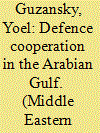

|
|
|
|
|
| Publication |
2014.
|
| Summary/Abstract |
The Arab Gulf states have systematically worked to tighten their cooperation in various fields. However, progress toward increased defence collaboration continues to be slow due to a number of factors including fears of angering neighbouring countries, particularly Iran; protecting state sovereignty; and reliance on other forms of defence, such as national militaries and foreign allies. This article traces the ups and downs of defence cooperation between the Arab Gulf nations, focusing on the establishment of the GCC and the joint Peninsula Shield Force, crucial milestones in Arab Gulf security coordination. A timeline of increased and decreased cooperation is presented, including during the two Gulf wars, along with the manner in which the joint force has been employed, its associated concerns, and the potential future for defence collaboration.
|
|
|
|
|
|
|
|
|
|
|
|
|
|
|
|
| 8 |
ID:
108258
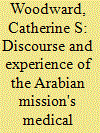

|
|
|
|
|
| Publication |
2011.
|
| Summary/Abstract |
In 1889 the pioneers of the Arabian Mission - a mission under direction of the Reformed Church in America - arrived in Arabia with the aim of Christianizing Muslims of the Najd and Arabian Peninsula. By the turn of the century, the missionaries were using medical knowledge and service as an interface for dialogue and evangelism. This article's aim is two-fold. First, it examines the history of the Arabian Mission and the history of medicine in the Gulf. Second, it explores the impact of the Americans on the Muslim communities from 1920 to 1960. To do so, it explores the experience of missionaries as well as the discourses missionaries constructed about Arabs and Arabia. It examines how the missionaries transcend the label of cultural imperialist, and how both the function and language of the missionaries evolved as oil wealth transformed the Gulf nations of Bahrain and Kuwait. This article, exploring the impact of the Arabian Mission from the late 1930s through 1960, continues the discussion published in the preceding issue of Middle Eastern Studies.
|
|
|
|
|
|
|
|
|
|
|
|
|
|
|
|
| 9 |
ID:
123636
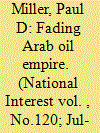

|
|
|
|
|
| Publication |
2012.
|
| Summary/Abstract |
PRESIDENT OBAMA'S pivot to East Asia is well-timed. The geostrategic importance of the Middle East is vastly overblown. The region matters to the United States chiefly because of its influence in the world oil market, but that influence has been in terminal decline for a generation, a fact almost wholly unnoticed by outside observers. A confluence of developments-including rising prices and production costs, declining reserves, and the availability of alternate fuels and unconventional sources of oil-will decisively undermine the defining role of the Middle East in the global energy market. Meanwhile, the United States has vital interests at stake elsewhere in the world at least as pressing, if not more so, than its interests in the Middle East. These include thwarting the proliferation of weapons of mass destruction, fighting transnational terrorism and maintaining stability in key strategic locations of the world.
|
|
|
|
|
|
|
|
|
|
|
|
|
|
|
|
| 10 |
ID:
109838
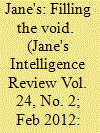

|
|
|
| 11 |
ID:
178187
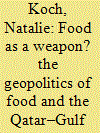

|
|
|
|
|
| Summary/Abstract |
On 4 June 2017, Qatar was suddenly put under an embargo by its regional neighbors – an effort spearheaded by Saudi Arabia and the UAE, who cut off most of its existing land, sea, and air traffic routes. With no domestic agriculture to speak of, Qatar’s external logistics networks are essential for maintaining its food supply. The country’s 2.6 million residents, many of whom flooded the grocery stores, were understandably concerned about their ability to secure food when news about the embargo broke. Eventually, new food supply chains were established, primarily with the assistance of partners in Iran and Turkey. The ongoing rift between Qatar and its neighbors in the Arabian Peninsula, manifested only in part by this effort to undermine the country’s material supply networks raises a number of questions about an old idea: that of food as a ‘weapon’. This article puts this concept in historical and regional perspective in the Arabian Peninsula through the lens of critical geopolitics, tracing the securitizing discourses about food security and their intertwining with narratives about territorial sovereignty, nationalism, and essentialist understandings of geography to explain the causes and effects of the food embargo in the ongoing Qatar–Gulf rift.
|
|
|
|
|
|
|
|
|
|
|
|
|
|
|
|
| 12 |
ID:
105673
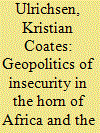

|
|
|
| 13 |
ID:
101915
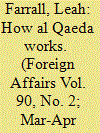

|
|
|
|
|
| Publication |
2011.
|
| Summary/Abstract |
Al Qaeda is stronger today than when it carried out the 9/11 attacks. Accounts that contend that it is on the decline treat the central al Qaeda organization separately from its subsidiaries and overlook its success in expanding its power and influence through them.
|
|
|
|
|
|
|
|
|
|
|
|
|
|
|
|
| 14 |
ID:
114905
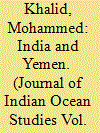

|
|
|
| 15 |
ID:
123031
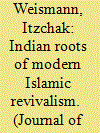

|
|
|
| 16 |
ID:
129798
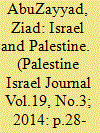

|
|
|
|
|
| Publication |
2014.
|
| Summary/Abstract |
The issue of land is at the core of the Palestinian - Israeli conflict. For a long time efforts aimed at achieving a settlement to the conflict were based on the principle of 'land for peace' meaning that if Israel withdraws from the occupied Arab territories, including the occupied Palestinian land, the Arabs will make peace with Israel.
|
|
|
|
|
|
|
|
|
|
|
|
|
|
|
|
| 17 |
ID:
106613
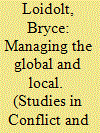

|
|
|
|
|
| Publication |
2011.
|
| Summary/Abstract |
On 29 October 2010, authorities in the United Kingdom and the United Arab Emirates intercepted explosive packages that had been placed on U.S.-bound planes. Less than a year earlier, Umar Farouq Abdulmutallab attempted to detonate explosives aboard Northwest Flight 253. These attacks originated and were organized in Yemen under the supervision of a local Al Qaeda affiliate known as Al Qaeda in the Arabian Peninsula. These attacks are a manifestation of the group's growing international ambitions, yet little scholarship on Al Qaeda explores how affiliates with robust ties to Al Qaeda leadership in Pakistan balance their dedication to global and local jihad(s). This article contends that despite its strong ties to Al Qaeda Central and international posture, Al Qaeda in the Arabian Peninsula still must maintain local relevance and support. Its ability to do so carries implications for counterterrorism policymakers and the broader Al Qaeda movement.
|
|
|
|
|
|
|
|
|
|
|
|
|
|
|
|
| 18 |
ID:
177278
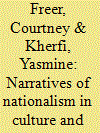

|
|
|
|
|
| Summary/Abstract |
Over the past decade, all six states of the Gulf Cooperation Council (GCC) have invested considerably in the development of their local heritage industries. In parallel, these states have expanded their efforts at fostering home-grown nationalism. What scholarship exists on the topic of expansion of the heritage industry tends to be anthropological, sociological, or linked to museum studies, while literature on nationalism tends to remain in the realm of political science. This article addresses disciplinary gaps by taking special account of the state’s role in producing heritage and culture to foster nationalism. This development has been neglected or taken for granted in past studies of heritage production and preservation in the Gulf, and therefore deserves more substantial academic inquiry. In the first part of this article, we assess ways in which the Arabian Peninsula provides a unique environment for the study of heritage sites, before looking at how different actors, including grassroots initiatives and more substantially the state, engage in heritage production to promote select narratives about citizens’ shared history and common identity. In so doing, this piece offers a critical reflection on the ongoing processes through which heritage-making, political power, and nation-building are uniquely intertwined in the GCC.
|
|
|
|
|
|
|
|
|
|
|
|
|
|
|
|
| 19 |
ID:
132483
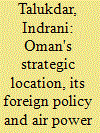

|
|
|
|
|
| Publication |
2014.
|
| Summary/Abstract |
Oman has emerged as a powerful small country in the international relations arena. With an independent and pragmatic foreign policy, Oman is maintaining a balanced relationship with all its neighbours, including Iran. In times of crisis, its policy will be an asset to the West, especially the US. It is against this backdrop that this article traces the strategic position of Oman, its foreign policy and its relationship with the US. It also focusses on Oman's defence forces, especially its air power. In doing so , the article analyses how India's position will be important for both Oman and the US. and vice Versa.
|
|
|
|
|
|
|
|
|
|
|
|
|
|
|
|
| 20 |
ID:
051390
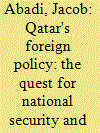

|
|
|
|
|
|
|
|